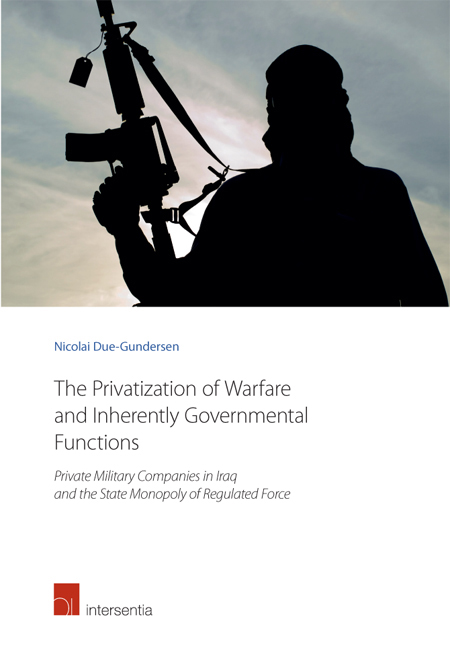 The Privatization of Warfare and Inherently Governmental Functions
The Privatization of Warfare and Inherently Governmental Functions Book contents
- Frontmatter
- Acknowledgments
- Contents
- Chapter 1 Introduction
- Chapter 2 The Recent History of PMCs
- Chapter 3 Literature Review
- Chapter 4 Methodology
- Chapter 5 Theoretical Approach and Terminology
- Chapter 6 Research Design
- Chapter 7 Main Analysis
- Chapter 8 The International Legitimacy of the ICoC
- Chapter 9 Final Conclusion
- Chapter 10 Addendum: The Business of Human Rights and Militarized Resource Companies (MRCs)
- References
- Appendices
Chapter 5 - Theoretical Approach and Terminology
Published online by Cambridge University Press: 21 September 2018
- Frontmatter
- Acknowledgments
- Contents
- Chapter 1 Introduction
- Chapter 2 The Recent History of PMCs
- Chapter 3 Literature Review
- Chapter 4 Methodology
- Chapter 5 Theoretical Approach and Terminology
- Chapter 6 Research Design
- Chapter 7 Main Analysis
- Chapter 8 The International Legitimacy of the ICoC
- Chapter 9 Final Conclusion
- Chapter 10 Addendum: The Business of Human Rights and Militarized Resource Companies (MRCs)
- References
- Appendices
Summary
THEORETICAL APPROACH
Elke Krahman's approach to norm measurement will act as the primary theoretical background to the main case studies of this thesis, namely public or media perceptions of the Nisour Square Massacre and the Abu Ghraib Prison Scandal. Krahman's framework of norm change has been chosen due to the fact that it is the sole framework this author has identified to measure norm changes within the context of private security. For the secondary case study that will examine the ICoC and its influence on state-PMC relations, the regulatory framework of Nils Rosemann's Code of Conduct will serve as a theoretical backdrop. Rosemann's Proposed Elements of a Code of Conduct for Private Military and Security Companies predates the ICoC. Moreover, the parallels between Rosemann's Code of Conduct and the ICoC itself allow Rosemann's Code to act as an appropriate comparison and theoretical approach to self-regulation and norm change.
In addition to Krahman's framework of measuring norm change and the regulatory proposal of Rosemann, it is worth outlining additional theories that will influence this study as central or peripheral contributions. The first contribution to this study's theoretical background is the political framework of Realism. Specifically, the seminal Realist works of Max Weber and Thomas Hobbes have been central to outlining the rights of states to monopolize the regulation and use of force. Weber's published lecture, Politics as a Vocation argues that successful state survival requires that the state monopolize force. Similarly, Hobbes’ 17th Century work, Leviathan, argues that the state must retain the exclusive right to make war and to raise armies. Of interesting note is Weber's territorial definition of state monopoly over force, with Weber arguing that the definition of a post-(first) world war state is one that “[…] successfully […] create[s] a monopoly of legitimate physical force as a means of government within a particular territory.” The territorial aspect of Weber's definition can be re-explored by placing Weber's argument within the contemporary context of Globalization Theory, which, in summary, argues that the process of globalization has led to interconnected and interdependent politics. As a result, territorial statehood and the nation-state are being eroded as, inter alia, security risks transcend once clearly delineated borders.
Information
- Type
- Chapter
- Information
- The Privatization of Warfare and Inherently Governmental FunctionsPrivate Military Companies in Iraq and the State Monopoly of Regulated Force, pp. 83 - 88Publisher: IntersentiaPrint publication year: 2016